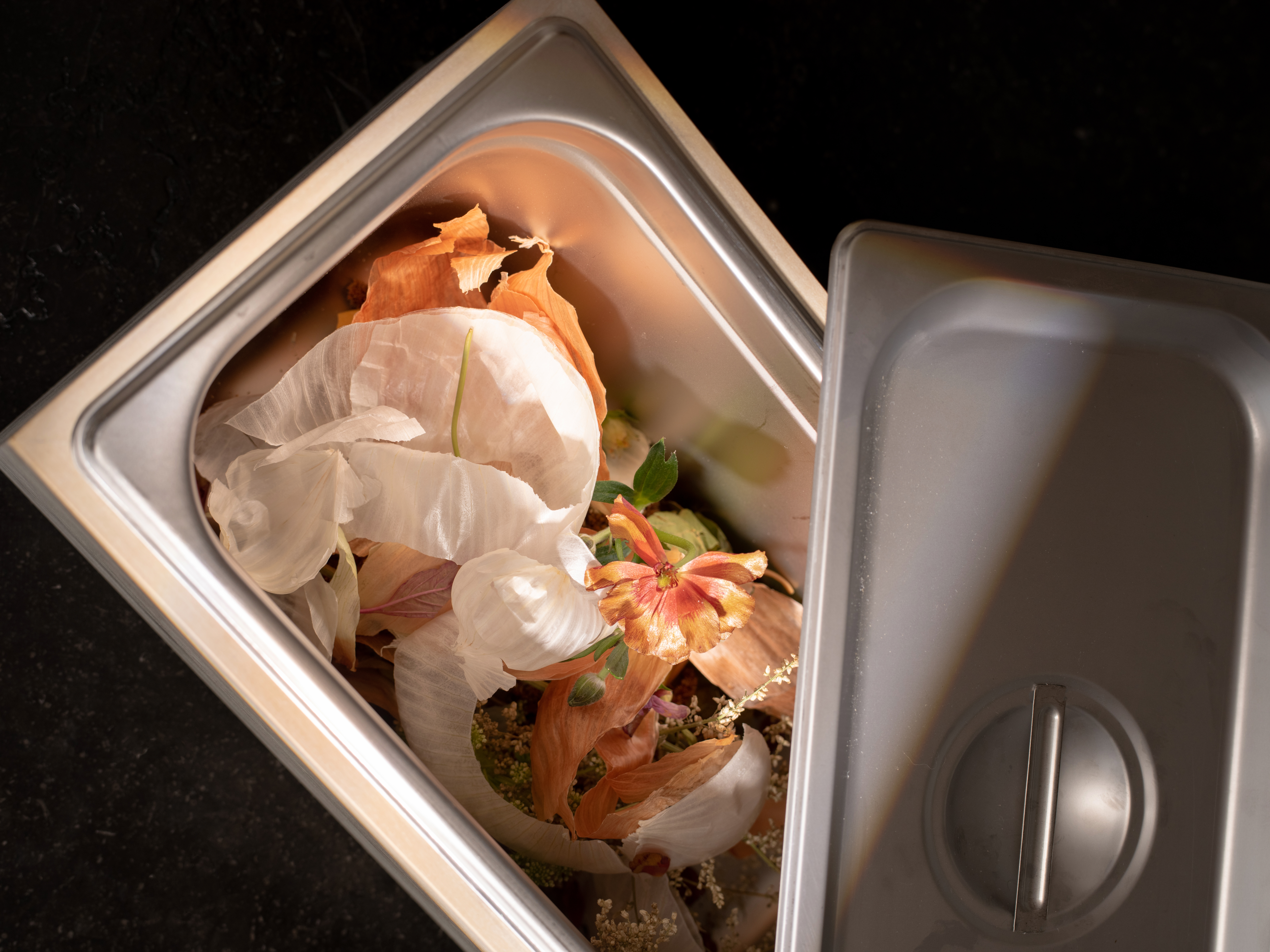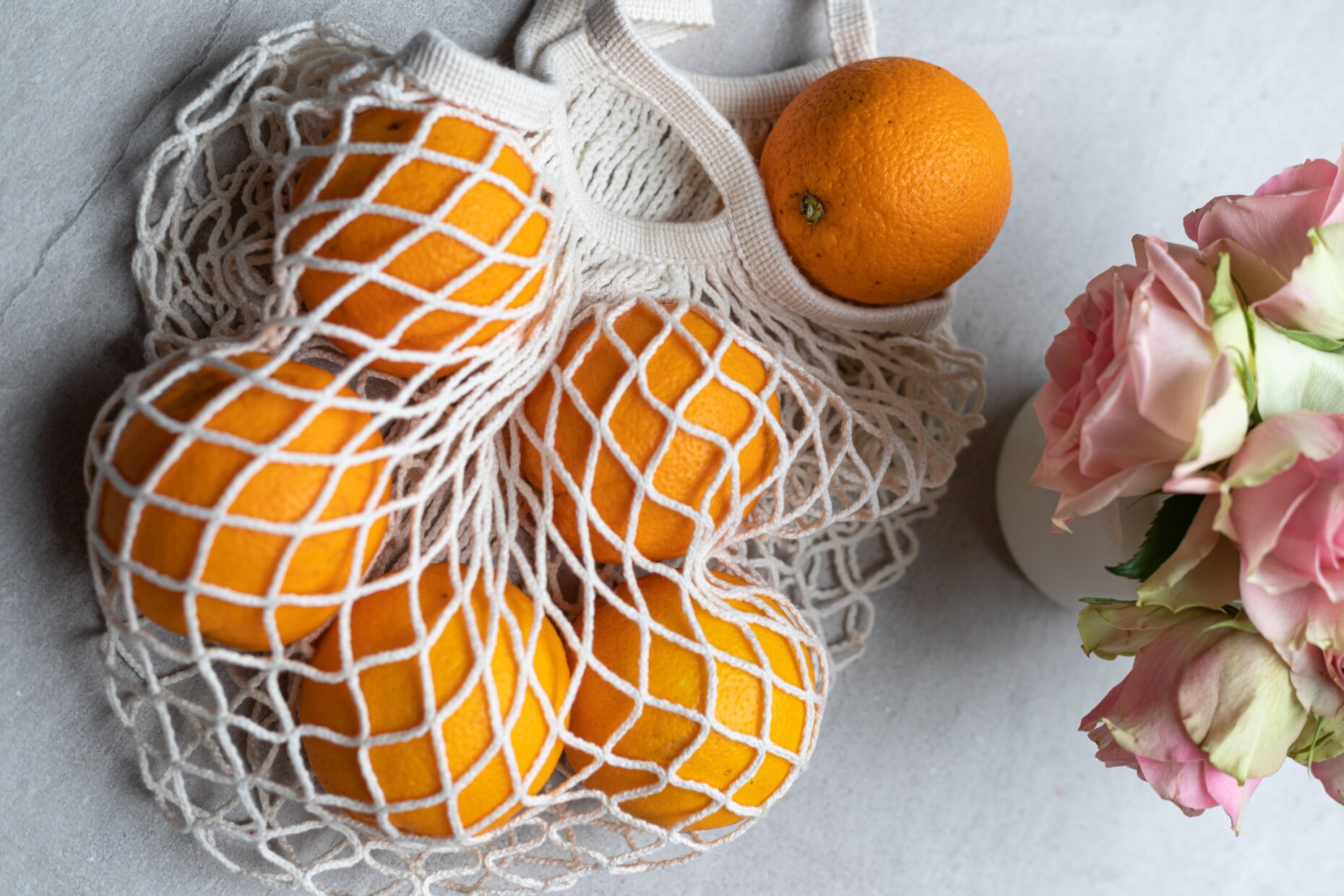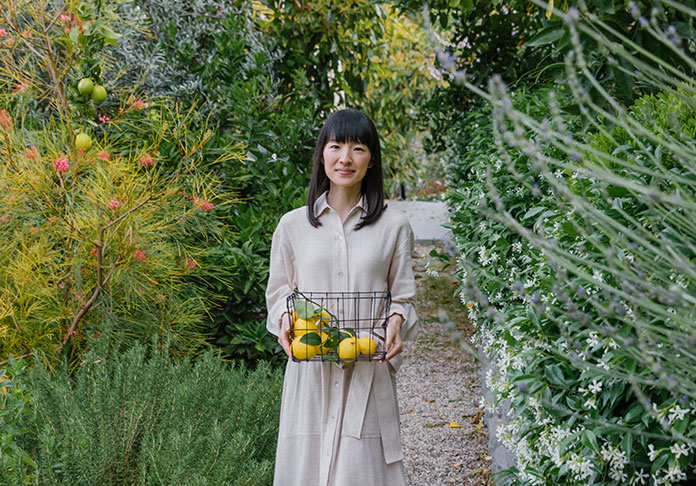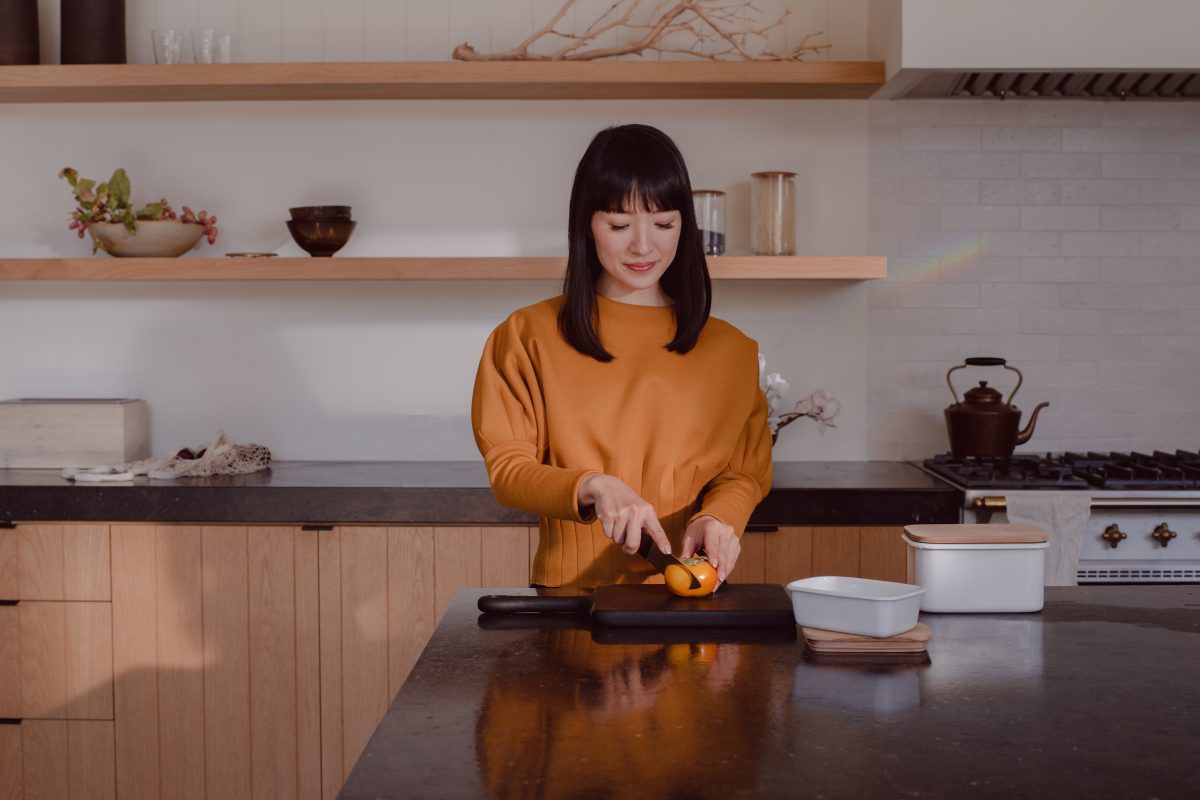Much of the KonMari Method™ can help reduce your impact and make your life and home more sustainable. In fact, one of our most popular articles of all time covers Marie Kondo’s five low-waste tips for the home.
But there are countless ways to make small changes around the house that add up over time — many of which we often overlook.
Because our KonMari Consultants spend their working hours helping countless households become more mindful and declutter, they often discover clever ways to cut down on waste and reduce impact. We asked them to share some of their favorite tips with us. Try one or many in your home — every bit counts!
01. Keep Reusable Bags in Your Car
Almost all of our KonMari Consultants recommend keeping reusable grocery bags in your car for good reason: it’s one of the easiest changes to make.
“I always say, ‘Start with taking your easiest steps toward sustainability, whatever that is for you,’ says Leigh Ann Cutright of A Functional Space. “Then, acknowledge your successes! That’s how we stay motivated and make changes over time.”
Ansley Hudson of Simply Sage Tidying and Helen Youn take it further. Hudson encourages her clients to store bags within one another. Doing so saves space in your car and allows you to have a perfectly sized bag for whatever you need. Youn, meanwhile, has a tip for those of us who are often on the move on foot. “I always carry a fold-up reusable shopping bag in my handbag, so I always have one on me when I go out,” she says.
02. …And Other Reusable Frequently Used Items, As Well
Does your home already use reusable grocery bags? Fantastic. Take it one step further with Julie Regina of Tidy Into Joy’s suggestion: “I recommend you do the same thing with travel coffee cups and water bottles,” she says. Keeping an empty one of each means you’ll be less tempted to request a paper cup if you stop for coffee, and a water bottle keeps you from ordering a plastic water bottle at lunch or elsewhere. “This way, while you’re out, you’ll always have something on hand to grab and use,” she says.
“Have a shopping list for everything! Plan your shopping and go shopping with a list…aligned to your ideal lifestyle. ”
03. Switch Home Essentials to Refillable/Low-Waste Products
Youn also recommends looking at the products you use daily and considering switching to refillable options. “I choose refillable products whenever possible,” she says, noting that many household products have a refillable option these days, “Some examples are cleaning products, fragrances, cosmetics, and skin and body care.”
04. Become More Intentional About the Materials in Your Home
Natalie Pham of Tidy Warrior encourages her clients to invest in storage and household items made from sustainable or recycled materials. “Living in the Bay Area, clients are more eco-conscious,” she says, “So I love using bamboo containers and storage solutions for my clients in their pantries (my favorites are The Container Store x Marie Kondo Shoji bins). They also make a pantry look earthy and warm.”
Hester Van Hien of Tidylicious teaches her clients to follow Marie Kondo’s advice and repurpose old containers to give them new life. “Don’t go out and buy any storage until you’ve had a look around your home for items that could be used as storage containers,” she says. “…[Think] shoe boxes or boxes from Apple products, plastic food containers and (pretty) tins. I even use empty (and cleaned out!) margarine tubs for small stationery such as erasers, pencil sharpeners, and washi tape.”
When it comes to household materials, Kathryn Kelly of Refresh Organizing recommends the art of the “swap.” On her list? “Glass containers for food storage instead of plastic bags, cloth napkins instead of paper, bamboo cotton rounds instead of cotton balls, homemade surface cleaners stored in glass bottles, beeswax food covers instead of plastic wrap, and glass containers for water instead of plastic bottles.”
“Always carry a fold-up reusable shopping bag in my handbag, so you always have one on you when you are out. ”
05. Cut Down on Laundry Day Energy Use
The laundry room is one of the biggest energy zappers in the house, and there are many ways to reduce impact. Start with Youn’s sustainability tip for laundry day: “I use dryer balls instead of dryer sheets — they’re natural, made of wool, and reusable for a long time,” she says.
Curious about how to do more? Here’s a tip from Celine Sumic of Lumen Living that gave us an a-ha moment: “I advise my clients to use a dehumidifier instead of a clothes dryer. This is much better for the clothes, the home, and the environment,” she says. “A more gentle drying process for your clothing equals a drier, warmer, healthier home, reducing the possibility of mold growth — and the retained heat and water collected can be reused to heat the home and water the plants!”
06. Use Fewer Plastic Garbage Bags
How often do you go through plastic garbage bags in your kitchen? Regina has a clever idea for cutting down, which will also help you kickstart a compost project. “Discard food scraps into a Ziploc or plastic bin in the freezer instead of in the garbage,” she says. “This way, your garbage won’t smell, the bag will last longer, and you can take the food scraps to your local compost program once it gets full.”

07. Focus on Becoming a More Intentional Shopper
We’re being encouraged almost every minute of every day to consume more. One of the best ways to reduce your impact is to become more thoughtful of what you purchase by focusing on what sparks joy. For this, our Consultants recommend returning to the KonMari Method’s roots.
“Having a shopping list for everything!” says Tina Markun. “Plan your shopping and go shopping with a list based on what needs to be replaced and is aligned to your ideal lifestyle — and have in mind what you can borrow, rent, or buy second-hand.”
Lisbet Byler of So Organized recommends shopping at one location first every time: your own home. “My number one trick for being more sustainable is to shop your home before buying anything!” she says. “Many times, we buy things when we’re out before checking to see if we already have them at home, leading to unnecessary excess and waste. Getting organized helps you know exactly where your things are so you can quickly check for what you have before buying extra items.”
Kelly loves to use a mantra to remind her to shop more mindfully: Let the store be your storage unit. “In our home, we tend to steer clear of duplicates, multiples, or bulk items. Particularly regarding consumables, we purchase what we need and only in an amount we know we’ll use.”
“Let the store be your storage unit. In our home, we tend to steer clear of duplicates, multiples, or bulk items. We purchase what we need and only in an amount we know we'll use.”
08. Reduce Impact in the Bathroom
“It’s truly disheartening and incomprehensible that we continue purchasing large plastic bottles for shampoo, conditioner, and detergent,” says Lykke Anholm of Melodic Living. “In the United States alone, a staggering 550 million empty shampoo bottles are discarded annually, enough to cover 1,164 football fields. This figure doesn’t include conditioner, body wash, or other bathing products—just shampoo bottles.”
Her advice? “Switching to solid shampoo and conditioner, natural detergents, and home-made fragrances for our homes made with natural organic ingredients is a massive step towards a more environmentally responsible choice.” And there’s a bonus: Switching to refills and reusable products saves money in the long run, so it’s a win-win for your home.
There are other ways to upgrade a bathroom to be more eco-friendly, as well. “Although this tip is unusual, after my clients attempt it, they wonder why they didn’t do it sooner: install a toilet bidet,” says Petra Pupić of Root of Joy. “[Using it] instead of wet wipes, which include plastic and other non-biodegradable materials, is one of the most significant sustainable bathroom hacks. Additionally, [you will use less toilet paper], reducing paper and plastic waste (since toilet paper is typically packaged in plastic).”
“Switching to solid shampoo and conditioner, natural detergents, and home-made fragrances for our homes made with natural organic ingredients is a massive step towards a more environmentally responsible choice.”
09. Don’t Discard Unwanted Home Goods — Pass Them On
“If I am replacing an item of furniture, I always place the old item at the edge of my house with a simple note saying ‘Please take,’” says Jane Fern of Simply Tidy with Jane. “Everything always gets taken. This is an easy way of passing on items to someone who can use them without traveling to a recycling center.”
Van Hien agrees. “It’s much easier than giving it away online or selling it, and it makes it more likely you’ll pass something onto someone else to use it.”
(For those of us in the United States, Craigslist’s “Free Stuff” section works well for this! Simply photograph and post your items, along with a street location for someone to pick them up.)
10. Keep It Simple
There are so many ideas for making your home sustainable, but in the end, the best hack is the one you’ll stick with. “My single best tip? Implement one change at a time,” says Amélie Saint-Jacques of Amélie Organizes. “There are so many ways that most of us could live more sustainably, but if we try to change everything all at once, it will never work! One step at a time.”
Stefanie Wiik of Neat Victory agrees and points out that embracing the KonMari Method is enough to change your impact fundamentally. “After completing my KonMari Tidying Festival, I discovered that my shopping habits changed considerably,” she says. “Now, before buying anything, I ask myself three questions: (1) Do I need it? (2) Does it spark joy? and (3) How do I really feel about it? My answers give me permission to invest in items I truly want that make me feel satisfied, and I save my money and reduce my environmental impact.”










